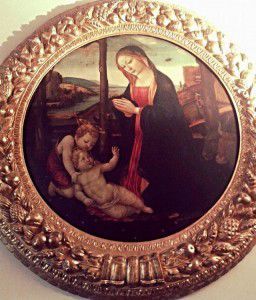The ‘’Madonna of the UFO’’ or ‘’Madonna of the flying saucer’’ is a painting located in Palazzo Vecchio in Florence in the Hall of Hercules. Also called “Madonna and Child with the Infant St John”, the painting has been the topic of much debate between art experts and ufologists. While the painting depicts the Nativity with the infant St. John in the foreground, in the background one can see a man curiously watching an unidentified flying object (UFO).
THE AUTHOR OF THE MADONNA OF THE UFO
The painting is of unknown origin, but it probably dates from as early as the sixteenth century. The caption under the picture attributes authorship to either Sebastiano Mainardi or Jacopo del Sellaio; conversely, some scholars attribute it to Filippo Lippi, also known as “Maestro del Tondo Miller,” after the title of one of his last works.
Moreover, we only know that the work comes from the forgotten convent of Sant’Orsola in the district of San Lorenzo in Florence.
THE DESCRIPTION OF THE PAINTING
The painting is round, is one meter in diameter, and is adorned with a precious golden frame; it is located in the Hall of Hercules on the second floor of the Palazzo Vecchio, which takes its name from the coffered ceiling depicting the Twelve Labours of Hercules.
The circular painting bears the usual iconographic motif of the Renaissance: in the foreground the Virgin is seen kneeling with folded hands and leaning toward the baby, who is lying on a hem of her garment.
While the baby Jesus is reaching his hand toward his mother, St. John is attempting to support him. Behind the head of the Madonna, an ellipsoidal object can be seen in the sky, one that is very similar to modern depictions of UFOs. There is also a man painted in the background, a shepherd, with his hand on his forehead and his head turned toward the sky. Next to him is a dog that is also looking in the direction of the flying object .
THE FLYING SAUCER IN THE PAINTING OF THE MADONNA WITH CHILD
For the reasons set out above, ufologists use the round painting the “Madonna dell ‘UFO” as evidence that UFO sightings date far back in time.
The unidentified flying object resembles a lead-colored disk that is tilted to the left and that has a kind of turret dome very similar to descriptions given by traditional science fiction to extraterrestrial spacecraft.
IS IT REALLY A UFO?
Many have asked themselves the reason why the artist chose to put a flying object in a picture dealing with sacred subjects.
According to art historians the flying saucer is actually an angel bearing the appearance of a luminous cloud. In fact, while the representation of an angel in a non-anthropomorphic manner is rare, the Scriptures, especially the apocryphal Gospels, contain descriptions similar to the iconography of the “Tondo del Maestro Miller”.
Another clue that this is an angel is the fact that in many paintings of the Florentine Renaissance the subject of the Nativity was accompanied by that of the Annunciation.
This scene is represented in very similar ways in many other Florentine paintings of the ‘400 and ‘500 that have as subject the Nativity or Adoration of the Infant Christ.
In most cases, a shepherd holds his hand over his forehead, as if to protect his eyes from the light of the “Glory of God,” referred to in many passages of the Gospels. It is also common to see a dog looking at the apparition. In many cases, the Angel comes out of a cloud surrounded by light or, in the oldest paintings, by golden rays.
THE DOGMA OF MARY’S VIRGINITY IN THE PAINTING
But the painting has another special feature: in the top left corner can be seen the Nativity Star with three other small stars or flames. A very similar detail is present in the Madonna of the Book (1480) by Sandro Botticelli.
The three stars in the Byzantine tradition of painting represent the threefold virginity of the Madonna: before, during, and after childbirth. Therefore, according to the hypothesis of art historians, the angelic, luminous cloud, and the three star are all meant to reiterate the cardinal dogmas of the Catholic faith.
Pictures by Wikipedia








